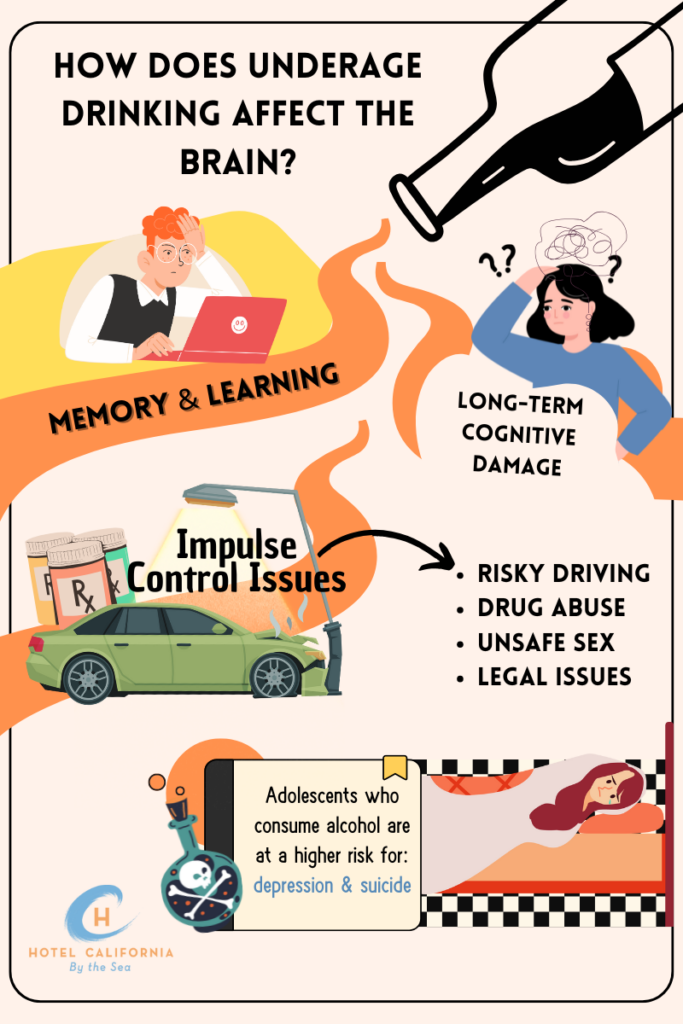How does Underage Drinking Affect the Brain?
Alcohol and underage drinking is nothing new. In fact, alcohol is one of the most commonly abused substances among teens, adolescents and young adults, according to data and research conducted by the Centers for Disease Control and Prevention. This is due to many factors, which include accessibility, availability, and social and cultural influences. Underage drinking is responsible for more than an estimated 4300 deaths each year. According to a 2023 National Survey on Drug Use and Health, an estimated 33.1% of people between the ages of 12 to 20 years old, reported having tried drinking alcohol at least once in their lifetime. This accounts for about 12.6 million people in the U.S. On a global scale, 22% of males and 5% of females reported binge drinking during their adolescent years.

Young people who participate in concerning patterns of drinking such as binge drinking, often do so during adolescence. Teens and young adults are more motivated to “explore” and “take risks” because their brain’s have not yet fully developed. The emotional area of the brain usually matures before the cognitive area of the brain. It contributes to the reason why teens embody thrill-seeking behaviors and risky decision-making behaviors.
Although teens and young people tend to drink less often compared to adults, they also tend to drink much more and usually in a binge drinking pattern. The adolescence stage is a critical time for brain development and involves significant physical, cognitive, emotional, social and behavioral changes. Underage drinking can negatively impact a young person’s cognition, brain structure and function. This can often lead to an alcohol use disorder. The chance of developing a substance use disorder is about 42% in young people who begin drinking before the age of 15 and only about 10% in young adults who wait until the age of 21 to drink.
Brain Development in Adolescents, Teens and Young Adults
The lower-order sensorimotor region of the brain matures first. Next to maturity is the limbic region, which is important for reward processing. The frontal region of the brain, which is associated with higher-order cognitive functioning is the last part to develop. It doesn’t fully form until late teens and young adulthood. Brain development trajectory can also depend on gender. Female brains begin developing one or two years earlier than males and it is why they are often more mature compared to their male counterparts.

How does Underage Drinking Affect the Brain?
During the adolescent stage in life, the brain undergoes a massive and complex developmental process. This includes the maturing of many different cognitive aspects of the brain. The frontal lobe is one of the last regions of the brain to develop. In fact, research has found that some people’s brain’s are not fully developed until at least the age of 25.
The frontal lobe controls higher-order abilities such as abstract thinking, impulse control and decision-making. When it is fully developed, a person will have improved cognition control, better and more logical decision-making skills and will be less impulsive. However, when alcohol is introduced into the brain early on, during the developmental stages, it can hinder and significantly impact brain growth. Heavy alcohol use can change normal development patterns that connect the different brain regions and can weaken connections between areas of the brain that regulate emotion and cognitive functioning.
Research on underage drinking found a reduction in the size of the frontal lobe, hippocampus, amygdala and corpus callosum in teens and young adults who are heavy drinkers. Ultimately, underage drinking can lead to natural brain development and can hinder a person’s cognitive and emotional development into adulthood.
Why are Teens and Young Adults drinking?
So why are teens and young adults more prone to underage drinking? While their brains have not fully developed, their immature frontal cortex is much more responsive to promises of rewards compared to an adult brain. Cognitive features of a young brain include heightened reward sensitivity, sensation seeking, impulsive behavior and diminished self-control that can inhibit certain emotions. All of these factors contribute to teens engaging in higher than normal rates of risky behaviors, which include underage drinking.
Because teens are driven by reward responses, they will place more value on short-term rewards over future benefits. The areas of the brain are not fully developed, which also means teens are more likely to react without taking into consideration the consequences. When it comes to underage drinking, it can result in temporary and short-term pleasure and then accepting the negative consequences later.
Check Your Insurance Coverage for FREE
Find out if your insurance covers addiction treatment in minutes. We accept most insurance!
The Dangers of Underage Drinking
- Underage drinking can lead to poor decision-making and engaging in potentially risky and harmful behavior resulting in negative consequences. It manipulates the brain into engaging in unsafe behaviors such as drinking, drinking and driving and even having unprotected sex.
- Underage drinking can make it more difficult for a young person to control their impulses and compromise their ability to see dangerous situations. This is because it disrupts the brain region called the amygdala.
- Underage drinking tricks the brain into thinking the decision to intake alcohol was a positive one because it can initially output feelings such as euphoria and pleasure.
- Even small amounts of alcohol can induce blackouts and subtle memory impairments in teens and young adults.
- Underage drinking significantly impairs a teen’s ability to learn and memory. During this stage in life, the brain is still undergoing development and when it has been compromised, it can lead to damage and inhibit full and natural brain growth. Decision-making, learning, memory and other important cognitive functions will be impaired and have negative effects into adulthood.
- Underage drinking can lead to a higher risk of intoxication, overdose and alcohol poisoning. Teens and young people often have a smaller and leaner body frame. This makes it easier for alcohol to enter the bloodstream. Within 5 minutes or so, alcohol can cross the blood-brain barrier. In young people, a large part of the alcohol consumed ends up in the brain compared to older adults.
- With underage drinking, the negative effects of alcohol can last longer in their brain compared to older adults.
- In young people, alcohol is less sedating compared to reactions in older adults. Alcohol can also significantly, but temporarily reduce social anxiety. These two factors make it more likely that a young person will participate in binge drinking over a longer period of time because they are not as impacted by the depressant effects of alcohol.
- Underage drinking inhibits the process that helps the hippocampus part of the brain form new cells.
- Underage drinking can increase the activation of brain signals that contribute to inflammation in the body.
How to Talk to Your Teens about Underage Drinking
It’s important to talk to teens about the effects of alcohol on the brain. Making sure they have all the right facts and information can help teens avoid dangerous situations and make better-informed decisions when it comes to alcohol use. Having strict guidelines and rules about alcohol use with consequences can be helpful. It is normal for teens to want to experiment. However, there should be consequences for those actions. Get to know your teen’s friends and peers. Through a shared community, it can help keep everyone safe. Finally, set a good example of a healthy relationship with alcohol. Teens are very impressionable and will mimic and respond to what they see.
Reach out to Hotel California by the Sea
We specialize in treating addiction and other co-occurring disorders, such as PTSD. Our Admissions specialists are available to walk you through the best options for treating your addiction.
Treatment for Alcohol Use Disorder
Underage drinking can significantly impair learning and memory in teens as they go through important developmental stages toward maturity. Young brains are malleable and easily influenced. Research has found that the earlier a person begins regularly drinking alcohol, the greater the likelihood of developing an alcoholic problem in adulthood. Underage drinking can “wire” the brain for alcohol use disorder, later in life. Hotel California by the Sea provides a specialized alcohol use disorder program for young adults who may be struggling with alcohol addiction.
We offer treatment at all levels of care including detox, residential, PHP and IOP. We utilize evidence-proven treatment methods such as CBT, DBT and EMDR therapy. Hotel California by the Sea is dedicated to helping our clients reexamine their relationship with alcohol and overcome their alcohol addiction.
References:
https://www.niaaa.nih.gov/publications/alcohol-and-adolescent-brain
https://www.mcleanhospital.org/essential/drinking-teen-brain
https://www.bbc.com/future/article/20240228-how-alcohol-affects-teens-and-young-adults-brains
https://pmc.ncbi.nlm.nih.gov/articles/PMC7183385
https://www.talkitoutnc.org/effects-of-alcohol-on-teenage-brain/
